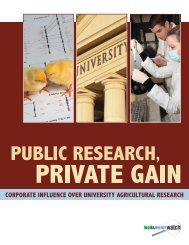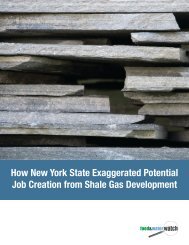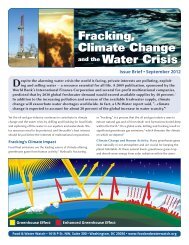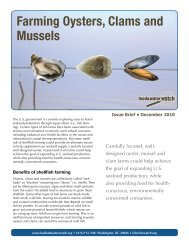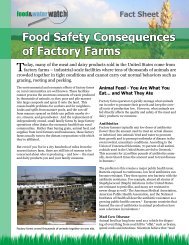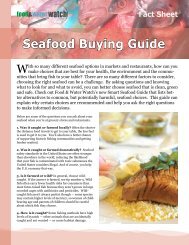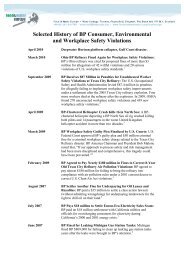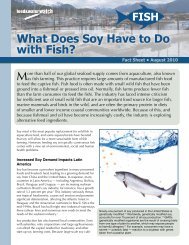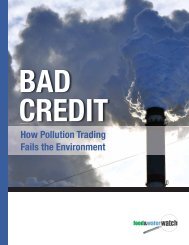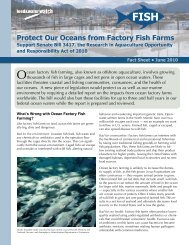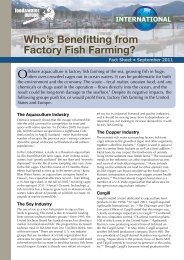Monsanto - Food & Water Watch
Monsanto - Food & Water Watch
Monsanto - Food & Water Watch
Create successful ePaper yourself
Turn your PDF publications into a flip-book with our unique Google optimized e-Paper software.
“snitch line” where neighbors and community members<br />
are encouraged to anonymously tattle on farmers that<br />
may be using <strong>Monsanto</strong>’s seeds without a license. 134<br />
The company fiercely defends its patent rights and<br />
stands behind the claim that it should be able to collect<br />
damages from anyone who violates them. 135 To achieve<br />
these ends, <strong>Monsanto</strong> has hired private investigators to<br />
videotape farmers, sneak into community meetings and<br />
interview informants about local farming activities. 136 The<br />
cases that result from the information <strong>Monsanto</strong> collects<br />
have seen the company demanding thousands of dollars<br />
in damages and legal fees from farmers who never chose<br />
to plant the company’s seeds in the first place. 137<br />
GE seed contamination is a legitimate concern for which<br />
<strong>Monsanto</strong> has refused to take responsibility. The very<br />
nature of plant reproduction means that pollen from<br />
crops is carried by the wind or insects to reproduce elsewhere.<br />
Any crops grown near GE crops are at risk of GE<br />
contamination through cross-pollination. Contamination<br />
can also occur when GE seeds are inadvertently mixed<br />
with non-GE seeds during storage or distribution. 138<br />
However, <strong>Monsanto</strong> states in its Technology Use Guide<br />
(which is required reading only for those planting<br />
<strong>Monsanto</strong> seeds) that responsibility for any specific<br />
“marketing standards or certification lies with that<br />
grower,” that the grower “inherently agree[s] to employ<br />
those practices appropriate to ensure the integrity and<br />
marketability of his or her crop” and that “each grower<br />
needs to be aware of the planting intentions of his or her<br />
neighbor in order to gauge the need for appropriate best<br />
management practices.” 139<br />
In other words, even farmers who do not grow <strong>Monsanto</strong>’s<br />
products must be held accountable for their neighbors’ GE<br />
crops, and <strong>Monsanto</strong> effectively eliminates the company’s<br />
responsibility for its own products. This is especially<br />
frightening for farmers when they see <strong>Monsanto</strong> going<br />
after those who inadvertently end up with <strong>Monsanto</strong>’s<br />
traits on their fields.<br />
Percy Schmeiser is one of the few lucky ones who won<br />
his case against <strong>Monsanto</strong> — or as much of a win as is<br />
possible in such an unfair fight. Schmeiser is a Canadian<br />
farmer who was found to be growing <strong>Monsanto</strong>’s GE<br />
canola plants in 1999, but he never intentionally planted<br />
<strong>Monsanto</strong>’s seed — it had blown on to his field either from<br />
passing trucks, or from five neighboring farms that all<br />
grew <strong>Monsanto</strong>’s canola. 140 <strong>Monsanto</strong> sued, and the case<br />
went all the way to the Canadian Supreme Court in 2004.<br />
While the court upheld <strong>Monsanto</strong>’s patent, it also decided<br />
that Schmeiser did not have to pay any fees to <strong>Monsanto</strong><br />
for the presence of the GE canola. 141 He was still, however,<br />
burdened by years of expensive legal fees.<br />
Most farmers aren’t as fortunate. According to a study<br />
conducted by The Center for <strong>Food</strong> Safety, <strong>Monsanto</strong><br />
had filed 136 lawsuits against American farmers as of<br />
2010. These lawsuits involved 400 farmers and 53 small<br />
businesses. 142 Another finding is that <strong>Monsanto</strong> keeps<br />
staff on hand solely for the purpose of investigating and<br />
prosecuting farmers. 143 Even for the farmers who win<br />
their cases, like Mr. Schmeiser, the process takes years<br />
of legal battle, stress and significant financial burden.<br />
Many farmers settle out of court rather than try to defend<br />
themselves — outside of recorded lawsuits, the company<br />
investigates roughly 500 farmers each year. 144<br />
<strong>Monsanto</strong> 13




